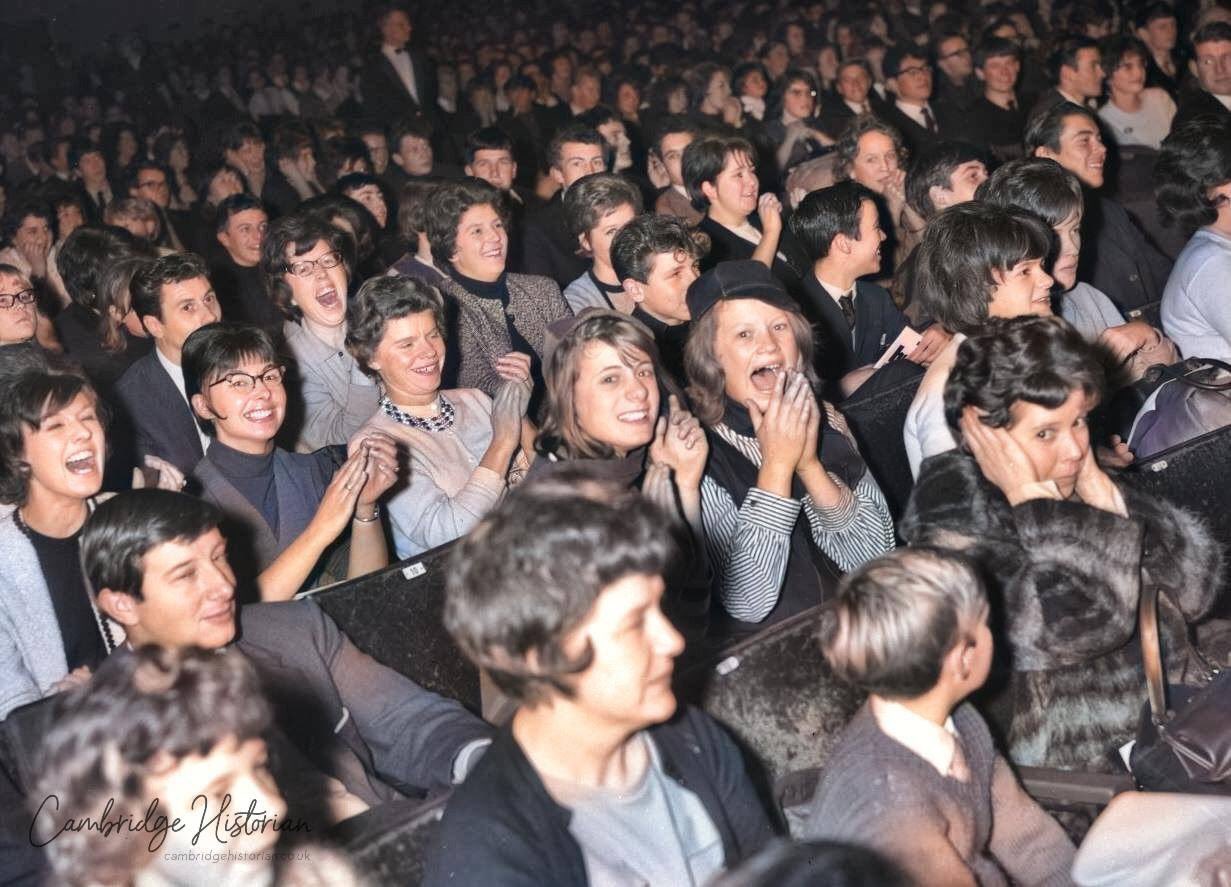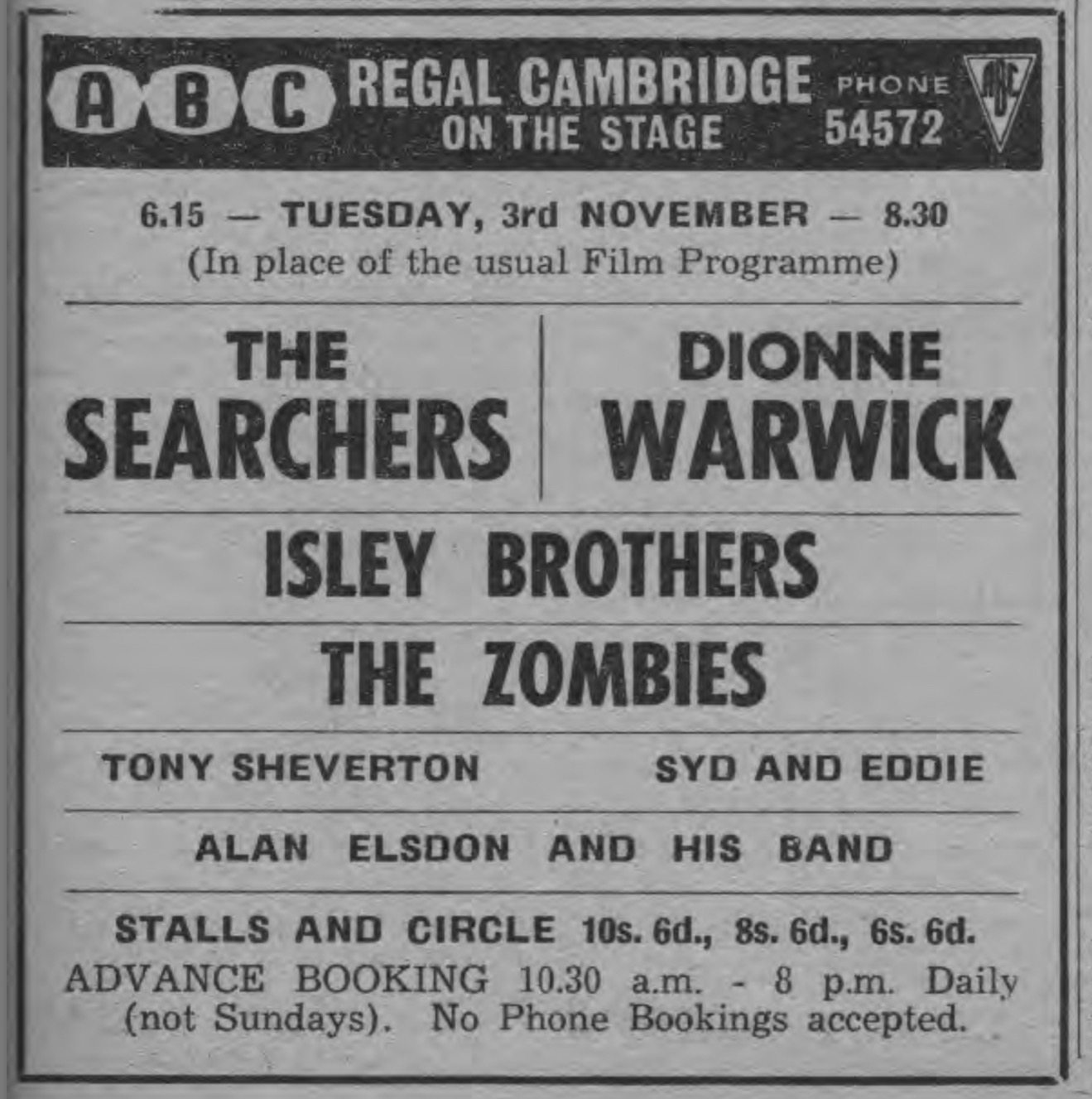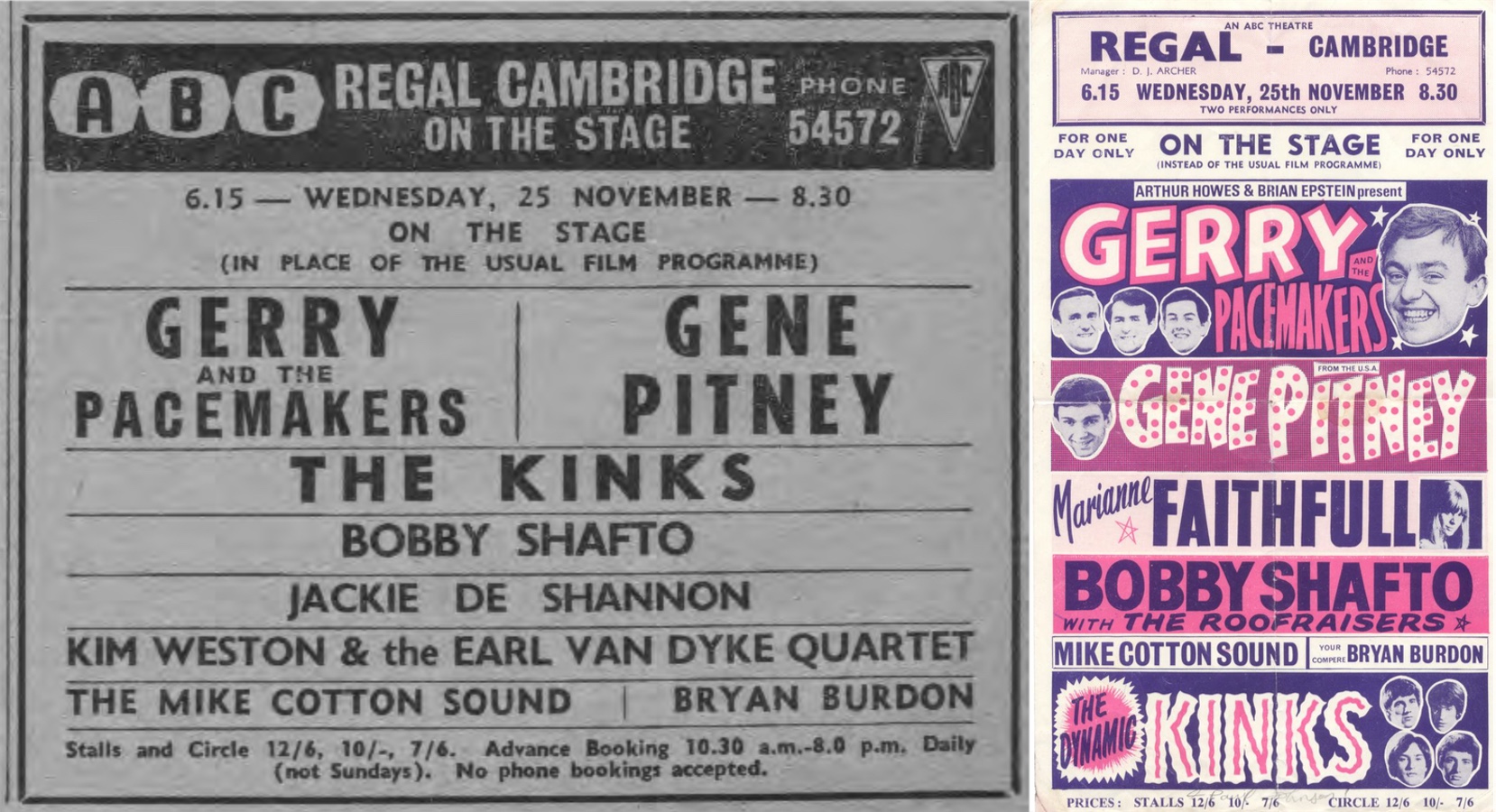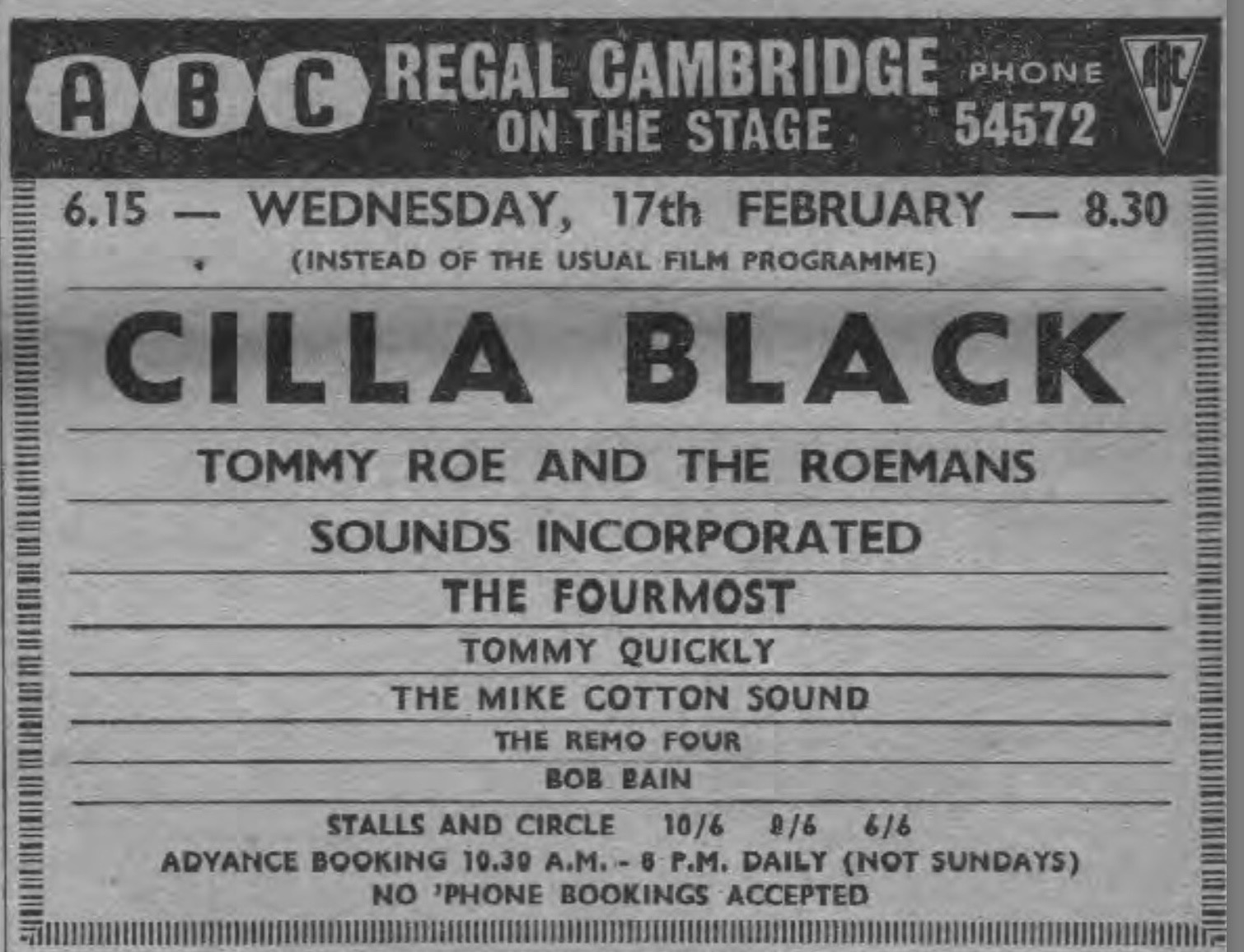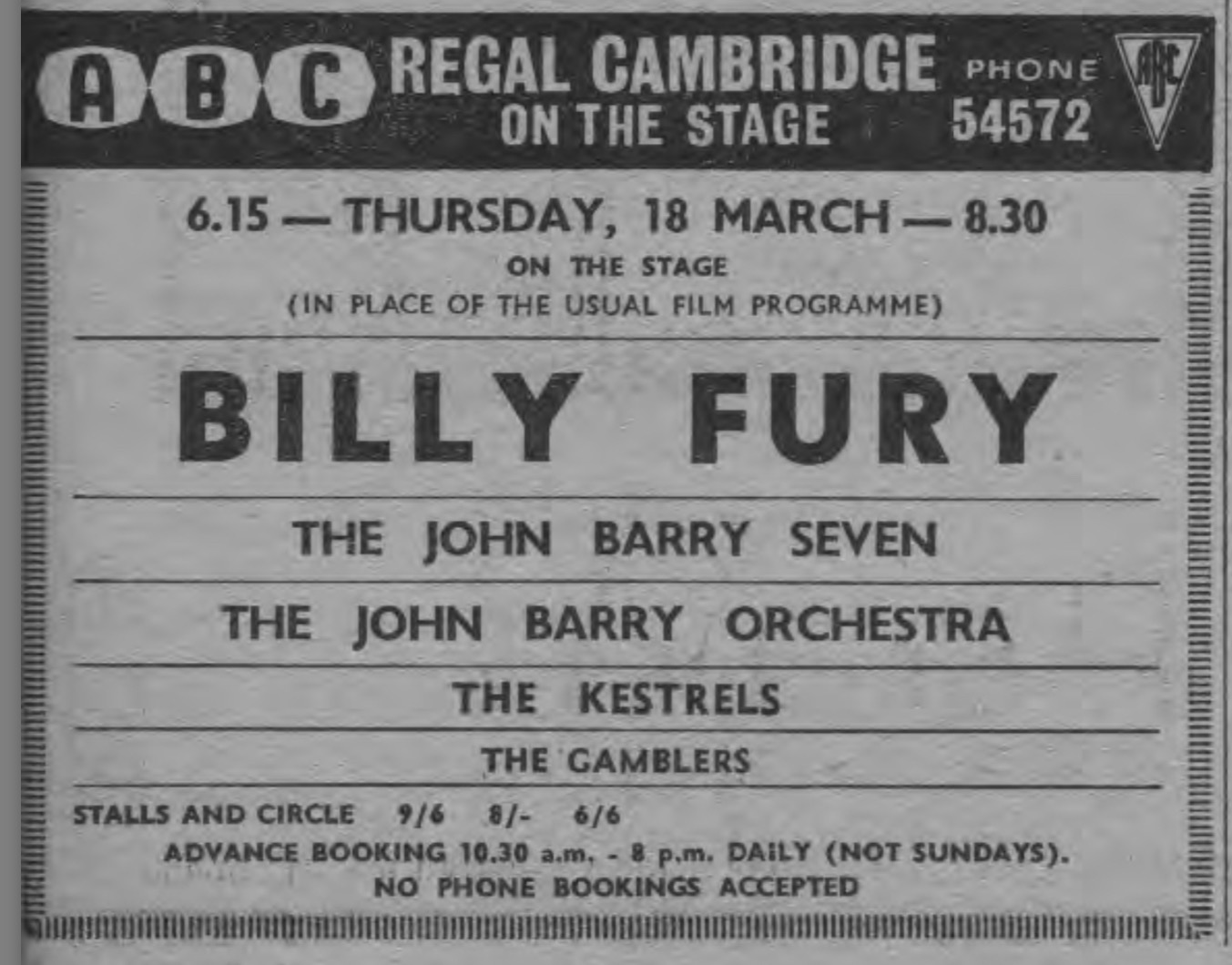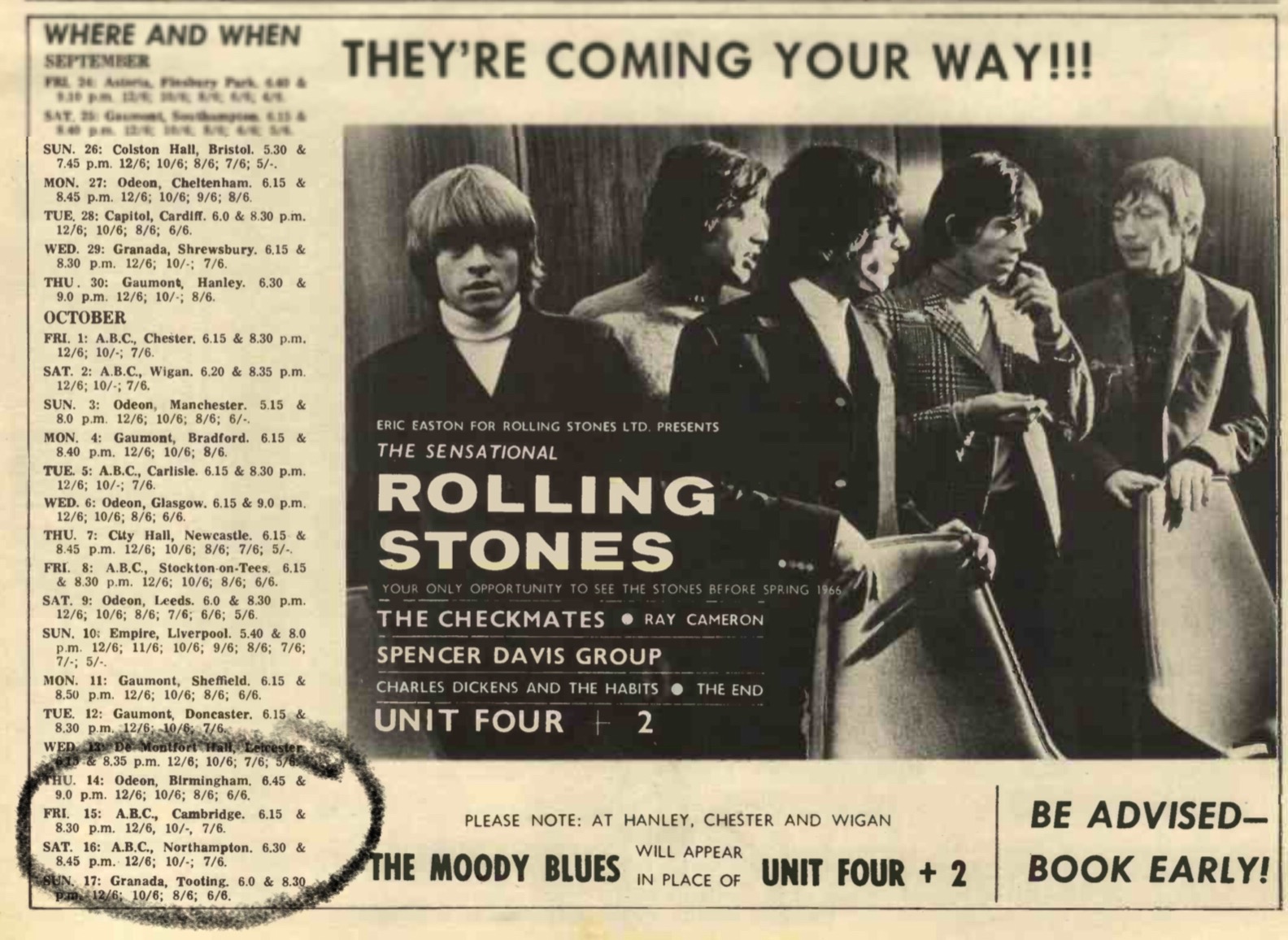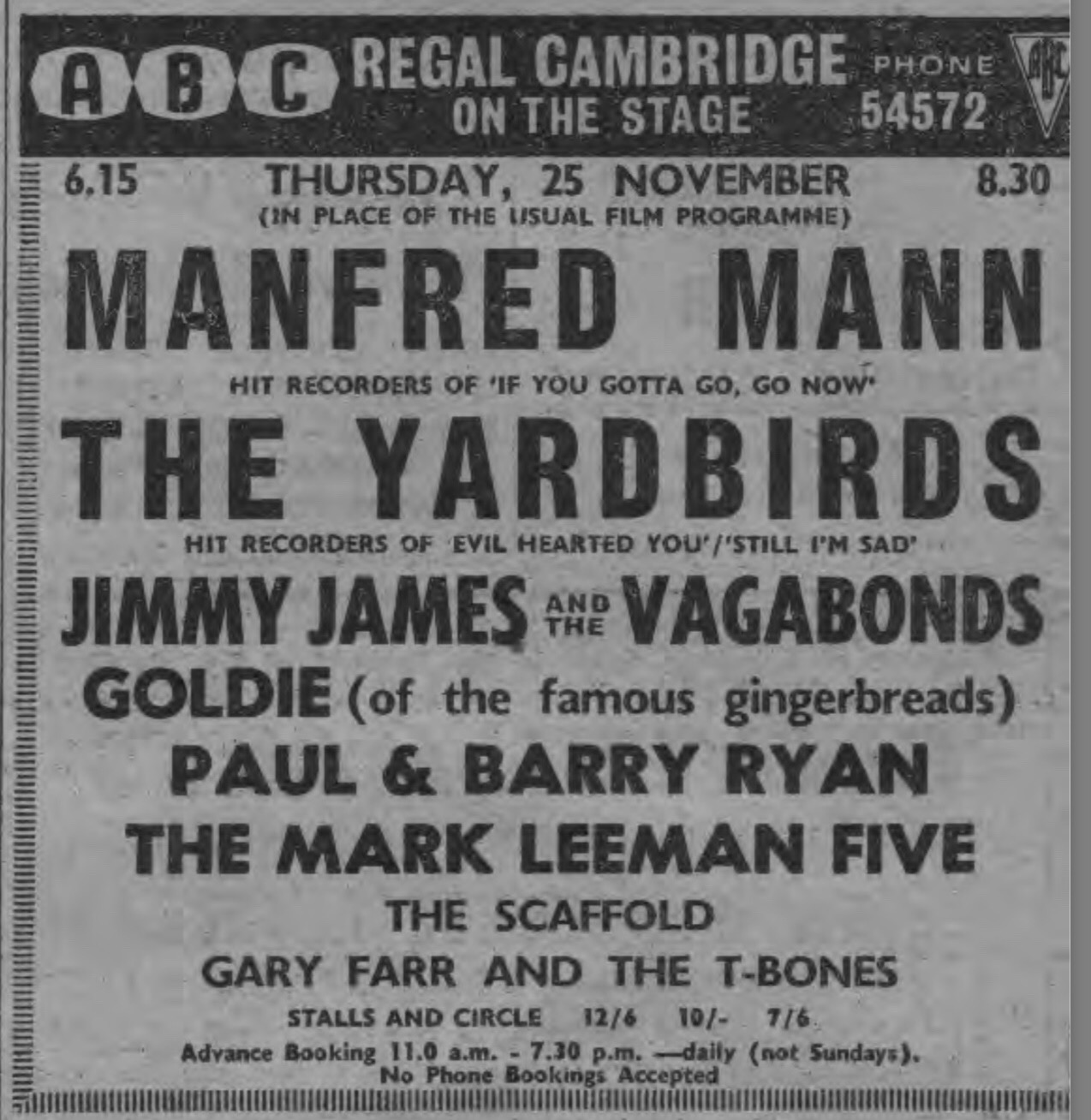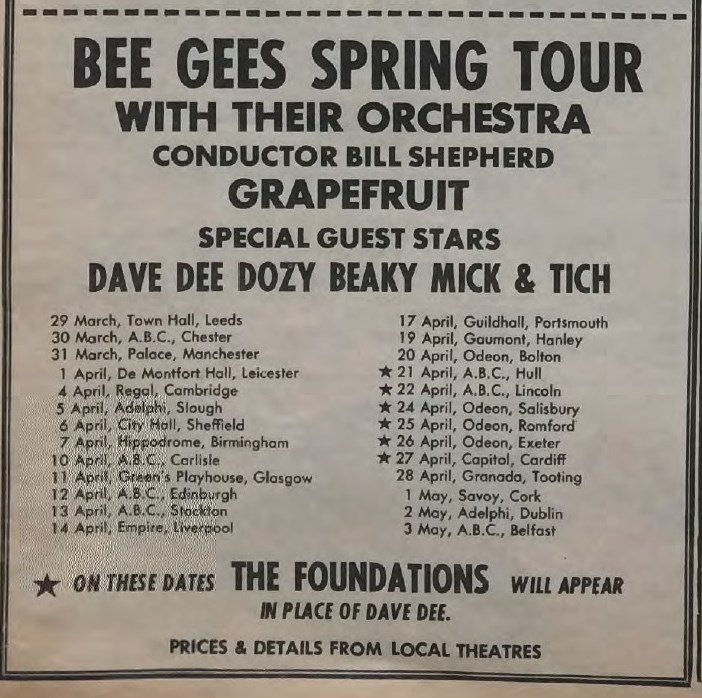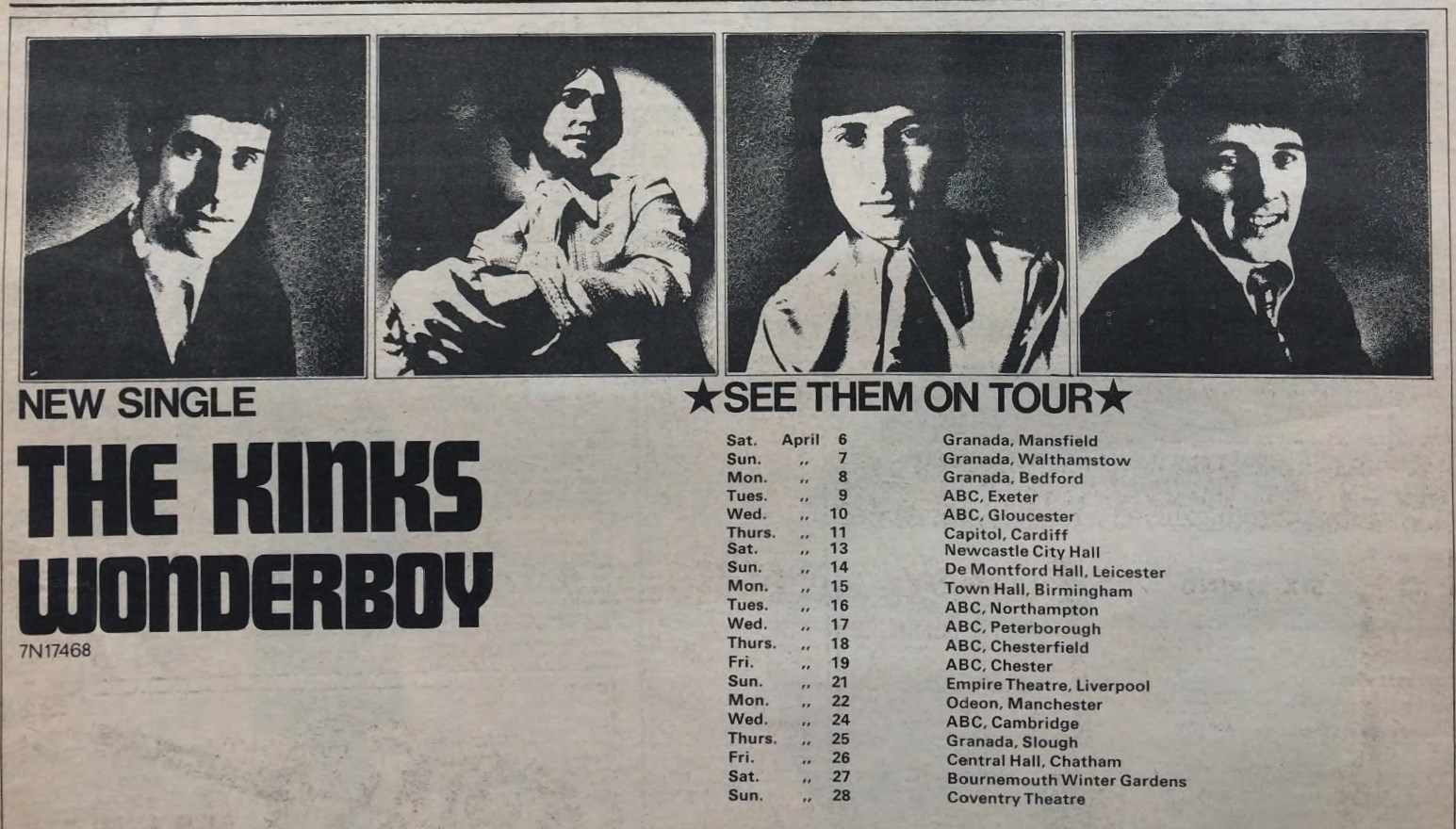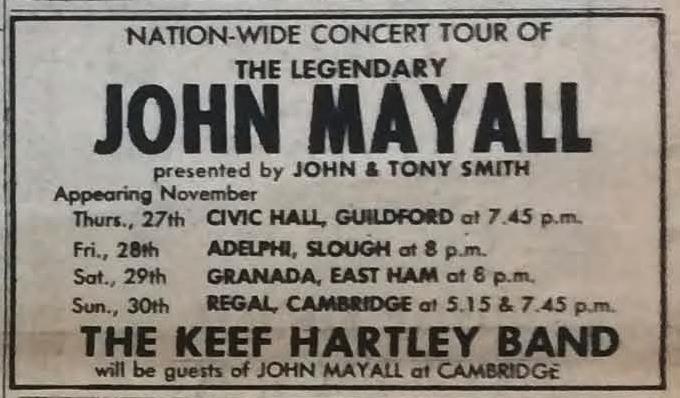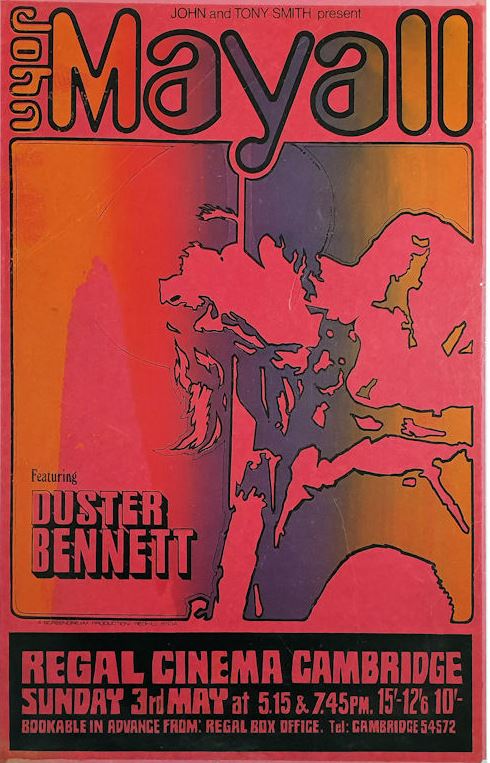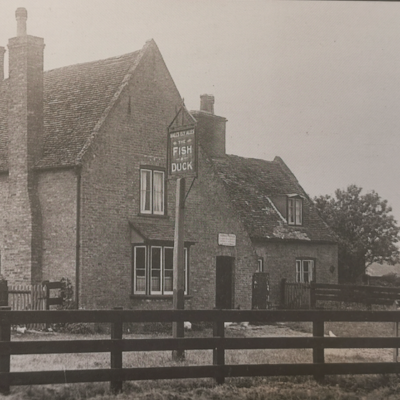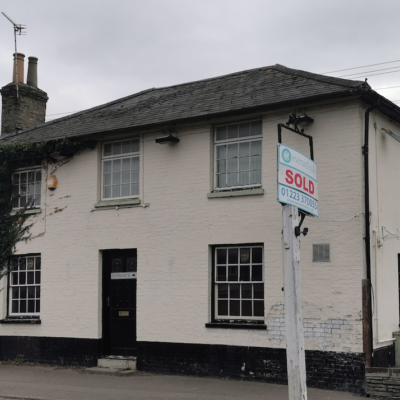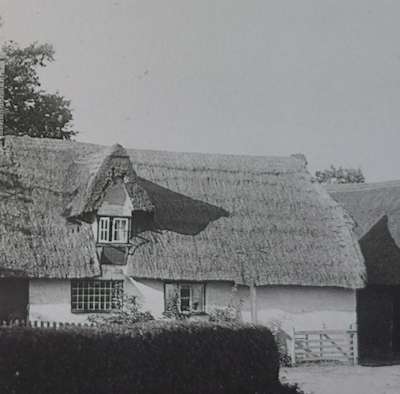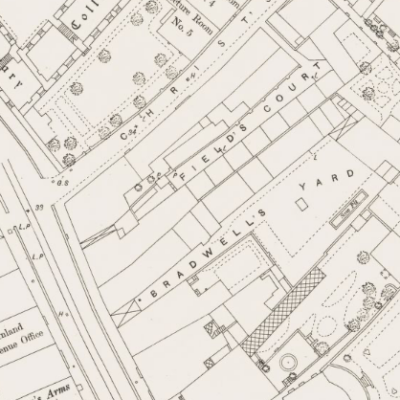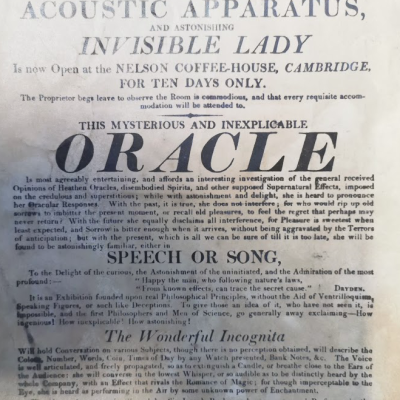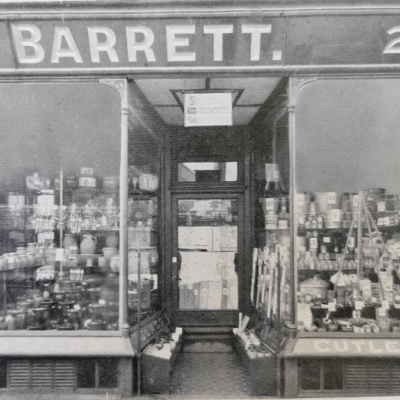Search by topic
- archaeology
- architecture
- bricklayer
- Building of Local Interest
- carpenter
- church
- crime
- dressmaker
- fire
- Great Eastern Railway
- listed building
- medieval
- oral history
- Public House
- Rattee & Kett
- Religious House
- Roman
- scholar
- school
- Then and Now
- tudor
- women
- work
- world war one
- world war two
Search by text
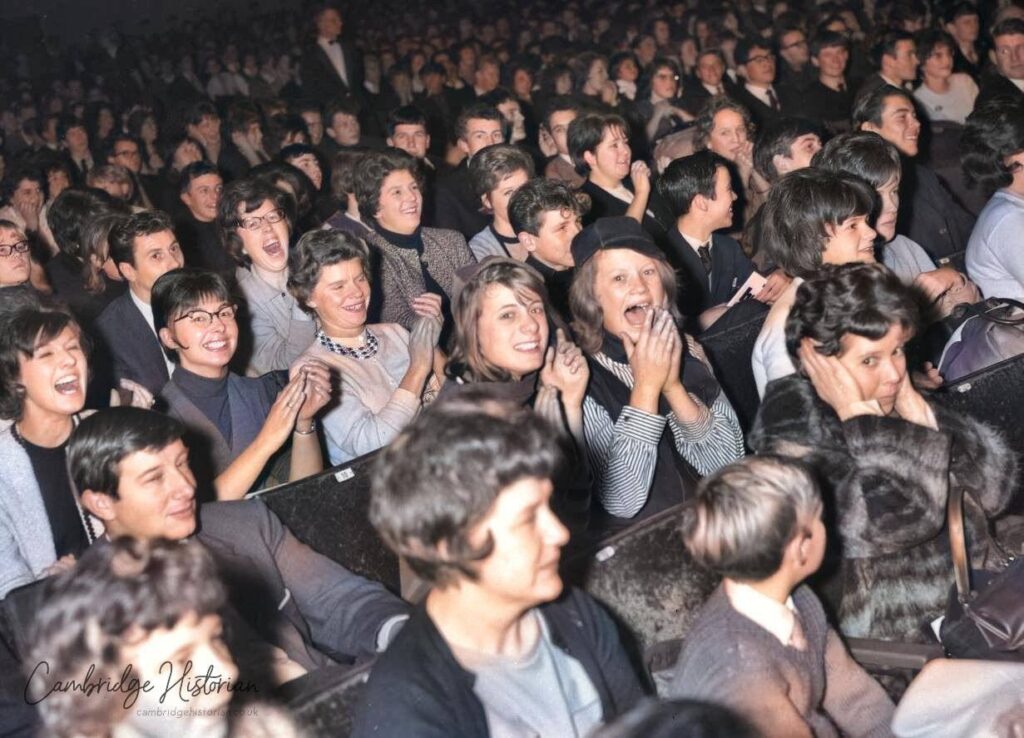
A Decade of Gigs at The Regal
The place to play in the 1960s
Before the Corn Exchange took over as the primary Cambridge venue for pop and rock gigs, the ABC Regal was the place to play. In pop’s younger days, provincial theatres capable of accommodating large audiences of mostly teenagers were limited, so touring acts often played in cinemas such as those run by the ABC and Odeon groups.
Following an appearance by Cliff Richard and the Shadows in 1959, the sixties saw the pick of the pops at the Regal. Several major names appeared there during the decade and fans from far and wide flocked to St Andrews Street to sit and watch – and scream at – their favourite bands and singers.
Most famously, the Beatles appeared at the Regal twice, both in 1963, but many other famous acts have also played Cambridge. Here are a few.
1960
13 May: Shadows; Jerry Lordan; Peter Elliott; Four Jones Boys; Billy Woods Five; Kathy Kirby; Norman Vaughan (compère)
19 October: Adam Faith; Honeys; Johnny Le Roy; John Barry Seven; Gerry Dorsey; Chris Carlsen (compère)
22 November: Emile Ford & the Checkmates; Ricky Valance; Patty Brook & the Diamonds; Dean Rogers & the Rebel Rousers; John Leyton; Norman Vaughan (compère)
Early shows often consisted of a ‘pop package’, comprising a compère (usually a prominent actor or celebrity), a headline act – or sometimes two if there was an intermission – plus several supports, all on one bill and each playing around three or four numbers. There were invariably two shows a night, usually starting at 6.15 and 8.30. Tickets cost just a few shillings, depending on whether you sat in the circle or stalls.
1961
17 January: Shirley Bassey; Ken Mackintosh & His Orchestra
1962
7 January: Temperance Seven
5 February: Billy Fury; Adam Faith; John Barry Seven
1963
27 February: Cliff Richard & the Shadows
19 March: Beatles; Chris Montez; Tommy Roe; Debbie Lee; Viscounts; Terry Young Six
The Beatles were initially at the bottom of the bill when this tour started, playing support to the joint headliners Chris Montez and Tommy Roe. Even with only two hit singles behind them though, they soon proved the more popular act. Their first album, Please Please Me, was released three days later.
13 September: Billy J. Kramer; Tommy Roe; Heinz; Dakotas; Fourmost; Chris Carlsen (compère)
13 October: Billy Fury; Joe Brown & the Bruvvers; Karl Denver Trio; Tornados; Mary Wilde; Ramblers
Part of a 60-date tour showcasing some of the most popular early-sixties acts, promoted by pop svengali Larry Parnes as ‘the biggest ever package tour ever to do the rounds of Britain’. The interesting thing here is the addition of the Ramblers backing band, who featured on guitar a local teenager, David Gilmour, five years before he joined Pink Floyd.
31 October: Del Shannon; Gerry & the Pacemakers
11 November: Helen Shapiro
26 November: Beatles; Frank Berry; Kestrels; Rhythm & Blues Quartet; Peter Jay & the Jaywalkers; Brook Brothers; Vernons Girls
The second appearance by the Beatles, this time definitely as the headline act. The Fab Four stayed over the road at the University Arms Hotel, where management banned staff from asking for autographs and threatened dismissal to any members of staff who invited friends onto the premises in the hope of catching a glimpse of their idols. The following day John Lennon, thinly disguised, was given a tour of the colleges by undergraduate (and later filmmaker) Tony Palmer.
1964
2 March: Gene Pitney; Billy J. Kramer; Swinging Blue Jeans
20 September: Hollies; Freddie & the Dreamers; Four Pennies; Marianne Faithfull
3 November: Searchers; Dionne Warwick; Isley Brothers; Zombies
25 November: Gerry & the Pacemakers; Gene Pitney; Kinks; Bobby Shafto; Jackie DeShannon; Kim Weston
Singer and songwriter Jackie DeShannon definitely appeared on this date, so presumably she was a last-minute replacement for the seventeen-year-old Marianne Faithfull, whose name is on the poster.
1965
17 February: Cilla Black; Tommy Roe; Sounds Incorporated; Fourmost; Tommy Quickly; Mike Cotton Sound
18 March: Billy Fury; John Barry Seven; Kestrels; Gamblers
9 April: Dave Clark Five; Kinks; Hollies
15 October: Rolling Stones; Checkmates; Spencer Davis Group; Charles Dickens; Habit; Unit Four + 2
The Rolling Stones’ only Cambridge gig. ‘They’re coming your way!!!’ the advert warned. Top ticket prices were 12s 6d (63p). Rock’s original bad boys had just had a hit with Get Off of My Cloud and were touring the album Out of Our Heads. Lower down on the bill, Charles Dickens was actually fashion photographer David Anthony, who enjoyed a brief career as a pop singer.
25 November: Manfred Mann; Yardbirds; Jimmy James & the Vagabonds; Paul & Barry Ryan; Mark Leeman Five; Scaffold; Gary Farr & the T-Bones
Billed as ‘the Marquee show’, an exciting shot of rhythm and blues, courtesy of two London headline acts that were rarely out of the charts at the time.
1966
27 May: Seekers
27 October: Hollies; Small Faces; Paul Jones; Paul & Barry Ryan; Nashville Teens; Peter Jay & the Jaywalkers; Robb Storme & the Whispers
11 November: Troggs
1967
3 November: Engelbert Humperdinck; Anita Harris
One for the mums and dads. Anita Harris was a last-minute replacement for Lulu on the tour.
1968
6 March: Dubliners
4 April: Bee Gees; Grapefruit; Dave Dee, Dozy, Beaky, Mick & Tich
Long before disco fever, the Bee Gees were on the ABC/Odeon circuit, with four top twenty hits in the previous year. They were supported by some friends of the Beatles called Grapefruit, and fellow popsters Dave Dee, Dozy, Beaky, Mick & Tich.
24 April: Kinks; Herd; Gary Walker; Tremeloes
In between albums but promoting their new single, Wonder Boy, the Kinks returned to Cambridge with one third of the Walker Brothers and the Tremeloes in support.
1969
26 February: Gene Pitney; Marmalade; Joe Cocker & the Grease Band; Iveys; Mike Cotton Sound; Mike Quinn
Promoted by Arthur Howes, the man who had taken the Beatles on the road in 1963. Pitney would travel to Cambridge on the tour coach, with his backing band the Mike Cotton Sound, it was reported. Marmalade intended to come by car, ‘so we can get home after’.
26 March: Stevie Wonder; Foundations; Flirtations; Big Movement; Raisins
Stevie Wonder’s only Cambridge appearance. Stevie, who was enjoying chart success with For Once in My Life, received rave reviews: ‘Whether he’s singing fast or slow, it seems he puts all that he’s got into every note’
3 April: Engelbert Humperdinck; Mary Hopkin
Crooner Engelbert returns, this time joined by Apple Records signing and TV talent show winner, Mary ‘Those Were the Days’ Hopkin.
24 April: B.B. King; Fleetwood Mac; Sonny Terry & Brownie McGhee; Duster Bennett
A blues package showcasing B.B. King on first UK tour. The Melody Maker interviewed King backstage at the Regal, reporting that the legendary guitarist thought very highly of his support act Fleetwood Mac, who were then crossing over from blues to pop with the hit single Man of the World.
17 October: Incredible String Band
Having already played Cambridge twice in 1969 (at the Rex and the Midsummer Pop free festival) this influential Scottish psych-folk group were touring their fifth album, Changing Horses.
30 November: John Mayall; Keef Hartley Band
1970
7 April: Badfinger; Gene Pitney; Marmalade; Joe Cocker; Mike Cotton Sound
Beatle discoveries Badfinger had already played the Regal a year earlier, as the Iveys, as well as Cambridge’s Dorothy Ballroom several times. Here they performed the usual two sets of twelve minutes each, with Joe Cocker on the bill.
3 May: John Mayall; Duster Bennett
Another blues event, which this time required a colourful poster to advertise it, designed by David Arnott. Ticket prices had nudged up to 15 shillings (75p) by the end of the decade. The poster now fetches over 100 times that in auction.
1971
7 March: Emerson, Lake & Palmer
5 May: Mungo Jerry
21 May: King Crimson; Roger Ruskin Spear and his Giant Kinetic Wardrobe; Simon Stable (compare)
The final three Regal gigs that can be traced emphasise the divergent music that would characterise the early seventies. Andy’s Records new stall on Cambridge market would soon be shifting albums by prog-rock giants ELP and King Crimson to longhairs in Afghan coats. These two gigs were promoted by John & Tony Smith / EG Management, who also handled Roxy Music. Mungo Jerry was strictly for the pop fans. It was reported that, embarrassingly, singer Ray Dorset’s trousers fell down during one number: ‘a roadie had to sneak on stage behind him to pull them up’.
After spring 1971, the Regal seems to have stopped hosting live music. Gigs continued at the Dorothy Ballroom for a while (the Velvet Underground and Hawkwind played there in 1971). But from this point on bands passing through Cambridge would mostly play the Corn Exchange, where there was no seating and, in those days, poor acoustics. But that’s a whole other story…
Rob Webb, July 2020.
Sources
- Michael Braun, All My Loving (Penguin 1963)
- Robert Webb, John Lennon (History Press 2016)
- cambridgehistorian.blogspot.com
- mygeneration.ccan.co.uk
- Tron-is-Kingtron-is-king.org.uk
- worldradiohistory.com
- www.100yearsofcoconuts.co.uk
- www.pinkfloydarchives.com
- www.setlist.fm
Contribute
Do you have any information about the people or places in this article? If so, then please let us know using the Contact page or by emailing capturingcambridge@
License
This work is licensed under CC BY-NC-SA 4.0









